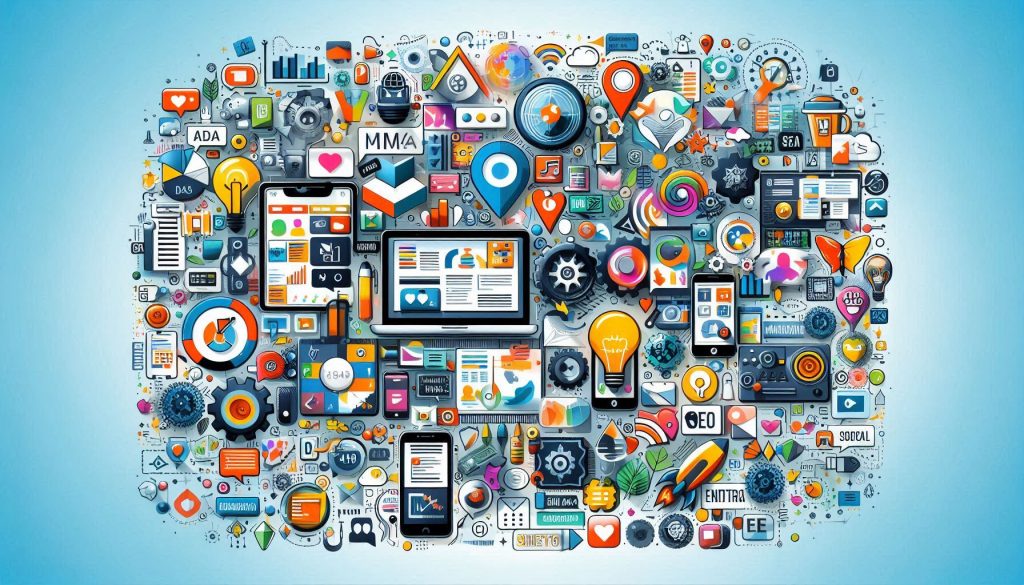One can use AI in digital marketing by leveraging its ability to analyze data and automate tasks. AI can help businesses improve their targeting, personalization, and overall efficiency in their marketing efforts.
As the world becomes increasingly digitized, businesses need to adapt their marketing strategies to stay competitive. AI offers a solution by providing tools that can help companies streamline their marketing efforts and improve their ROI. With AI, businesses can analyze large amounts of data to identify patterns and trends that can inform their marketing strategies.
AI can also be used to automate tasks such as email marketing, social media management, and customer service, freeing up time for marketers to focus on more strategic initiatives. We will explore how businesses can use AI in digital marketing to improve their performance and stay ahead of the competition.
Understanding AI in Digital Marketing
AI technology is transforming the way digital marketers reach their target audience. By leveraging AI-powered tools such as chatbots, predictive analytics, and personalized content, businesses can improve their marketing strategies, increase customer engagement, and boost their ROI. With the right approach, companies can effectively use AI to enhance their digital marketing efforts and stay ahead of the competition.
Understanding AI in Digital Marketing The utilization of AI in digital marketing has revolutionized the way businesses engage with their audience. This transformative technology has become an invaluable tool for marketers seeking to enhance their strategies and achieve greater impact. Understanding the evolution, benefits, and practical applications of AI in digital marketing is essential for any modern marketer.
Evolution of AI in Marketing
The evolution of AI in marketing has been remarkable. From its early stages as a theoretical concept to the present day, where it is widely integrated into marketing strategies, AI has undergone significant advancements. Initially, AI was primarily used for data analysis and prediction, but with the development of machine learning and deep learning algorithms, its capabilities have expanded to include personalized customer experiences, predictive analytics, and real-time content optimization.
Benefits of AI in Digital Marketing
The benefits of incorporating AI into digital marketing strategies are extensive. With AI-powered tools, marketers can gain deeper insights into consumer behavior, automate repetitive tasks, personalize content at scale, and optimize advertising campaigns for better performance.
Additionally, AI enables marketers to create more targeted and relevant messaging, leading to improved customer engagement and higher conversion rates. In conclusion, understanding the evolution and benefits of AI in digital marketing is crucial for marketers aiming to stay ahead in today’s competitive landscape. By leveraging the power of AI, businesses can unlock new opportunities, improve efficiency, and deliver more impactful marketing experiences to their audience.
Implementing Ai in Digital Marketing
Implementing AI in digital marketing can significantly enhance a company’s ability to engage with and understand its audience. By leveraging AI-powered tools, businesses can create personalized experiences, optimize targeting, and improve the overall effectiveness of their marketing efforts. In this section, we will explore how AI can be implemented in digital marketing, focusing on AI-powered personalization and predictive analytics for targeting.
Ai-powered Personalization
AI-powered personalization allows marketers to tailor content and communications to individual consumers based on their behaviors, preferences, and demographics. By analyzing vast amounts of data, AI can identify patterns and trends, enabling brands to deliver highly relevant and timely messages to their audience. This level of personalization can lead to increased engagement, improved customer satisfaction, and ultimately, higher conversion rates.
Predictive Analytics For Targeting
Predictive analytics leverages AI algorithms to forecast future outcomes based on historical data. In digital marketing, predictive analytics can be used to identify the most promising leads, anticipate customer needs, and optimize ad targeting. By analyzing various data points, such as browsing history, purchase behavior, and social media interactions, marketers can better understand their audience and deliver more precise, targeted campaigns.
Enhancing Customer Engagement With Ai
Chatbots For Customer Support
Chatbots have revolutionized customer support in the digital marketing realm. By utilizing AI, companies can provide 24/7 customer service. Chatbots are capable of answering frequently asked questions and resolving simple customer queries instantly. This not only enhances customer satisfaction but also reduces the workload on support teams, allowing them to focus on more complex issues.
Ai-driven Content Recommendations
AI-powered content recommendations are a game-changer in digital marketing. By analyzing user behavior and preferences, AI algorithms can deliver personalized content recommendations to website visitors. This not only enhances user engagement but also increases the likelihood of conversion. The ability to tailor content based on individual preferences can significantly improve the overall user experience.
Optimizing Marketing Campaigns With Ai
Optimizing Marketing Campaigns with AI is a game-changer in the digital marketing landscape. By harnessing the power of artificial intelligence, businesses can refine their strategies, personalize their approach, and achieve better results. Let’s explore some key ways AI can be leveraged to optimize marketing campaigns.
Ai For A/B Testing
A/B testing is crucial for understanding which marketing strategies resonate best with your audience. With AI, this process becomes more efficient and insightful. AI algorithms can analyze vast amounts of data and identify patterns to determine the most effective variations. This not only saves time but also ensures that marketing efforts are constantly fine-tuned for maximum impact.
Automated Ad Targeting
Automated ad targeting powered by AI allows for hyper-personalized advertising. By utilizing AI algorithms to analyze user behavior, demographics, and preferences, marketers can deliver targeted ads to the most relevant audience segments. This not only increases the likelihood of engagement and conversion but also optimizes ad spend by reaching those most likely to convert.
Measuring Success With AI in Marketing
Tracking and evaluating the effectiveness of digital marketing strategies is crucial for businesses to optimize their campaigns. With the advancement of AI technology, measuring success in marketing has become more efficient and accurate.
Ai-based Performance Analytics
AI-based performance analytics allow marketers to delve deeper into the data and gain valuable insights. This technology can analyze vast amounts of information in real-time, providing a comprehensive view of campaign performance.
ROI Tracking With Ai
AI-driven ROI tracking enables marketers to precisely measure the return on investment of their marketing efforts. By leveraging AI algorithms, businesses can track and attribute revenue to specific marketing channels, optimizing their budget allocation.
Challenges Of Using Ai In Digital Marketing
Using AI in digital marketing can be challenging due to the complexities involved in analyzing vast amounts of data and ensuring the accuracy of predictions. However, by leveraging AI technology, businesses can gain valuable insights into customer behavior and optimize their marketing strategies to increase ROI.
Artificial Intelligence (AI) has revolutionized digital marketing, but it comes with its own set of challenges. Understanding and addressing these challenges is crucial for businesses to leverage AI effectively in their digital marketing strategies.
Data Privacy Concerns
The data privacy concerns associated with using AI in digital marketing are a major challenge. As AI algorithms rely on vast amounts of data to make accurate predictions and recommendations, there is a risk of compromising consumer privacy. Businesses must navigate the complexities of data privacy regulations and ensure that they are using consumer data ethically and in compliance with laws such as the GDPR and the California Consumer Privacy Act.
Integration Complexity
Integration complexity is another significant challenge when implementing AI in digital marketing. Integrating AI-powered tools and platforms with existing marketing systems and processes can be complex and time-consuming. Businesses need to ensure seamless integration to avoid disruptions and maximize the benefits of AI technology. By addressing these challenges head-on, businesses can harness the power of AI to enhance their digital marketing efforts and gain a competitive edge in the ever-evolving online landscape.
Future Trends In AI-driven Marketing
AI-powered voice Search Optimization
In the realm of digital marketing, AI-powered voice search optimization is gaining momentum. Optimizing content for voice search is crucial for businesses to enhance their visibility in search engine results.
Ai-generated Content Creation
AI-generated content creation is revolutionizing the way brands produce engaging material. Leveraging AI algorithms can streamline the content creation process, ensuring relevance and quality.
Conclusion and Actionable Steps
Discover how AI revolutionizes digital marketing. Implement actionable steps to leverage AI for targeted campaigns and data-driven strategies effectively. Streamline processes and enhance customer engagement with AI-powered tools.
Developing An Ai Strategy
Craft a clear AI strategy aligned with business objectives. Identify key areas for AI implementation. Collaborate with cross-functional teams for insights.
Continuous Learning And Adaptation
Embrace a culture of learning and innovation. Regularly evaluate AI performance. Leverage data for real-time optimization.
Frequently Asked Questions
How Do Digital Marketers Use Ai?
Digital marketers use AI for data analysis, personalized content, chatbots, ad targeting, and predictive analytics.
What Are Some Examples Of How Ai Could Be Used In Marketing?
AI can be used in marketing for personalized content, predictive analytics, chatbots for customer service, and targeted advertising. These applications help businesses understand customer behavior and preferences, optimize campaigns, and improve customer engagement.
How To Use Generative Ai For Digital Marketing?
To use generative AI for digital marketing, create personalized content, analyze data for insights, and automate tasks. Incorporate AI tools for targeted ads and customer segmentation to enhance marketing strategies.
How Is Ai Used In Online Advertising?
AI in online advertising uses data analysis to target audiences, personalize ads, and optimize campaigns for better performance. It automates bidding and ad placement, improving efficiency and ROI. AI also helps in predicting consumer behavior and trends for more effective ad strategies.
Conclusion
To sum up, incorporating AI in digital marketing revolutionizes strategies. Stay ahead of the curve by leveraging AI’s capabilities. Enhance personalization, optimize campaigns, and boost ROI. Embrace AI as a powerful ally in navigating the ever-evolving digital landscape. Elevate your marketing efforts with AI-driven insights and innovations.

